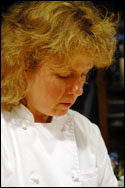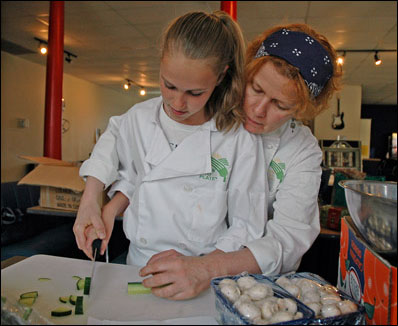The Three Women Behind Plow to Plate
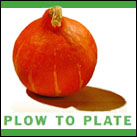
Plow to Plate is a dynamic coalition of physicians, farmers, chefs, restaurateurs, community leaders, land preservationists and local who have come together to promote and increase consumption of healthy, locally grown food by the community at large as well as within institutional settings.
Plow to Plate is the brainchild of three extraordinary women, each with a profound commitment to alter the way that healthcare is dispensed by promoting nutrition first, through encouraging the community to support local food production. The Plow to Plate model is revolutionary and serves as a model not only for what can be done but for what should be done when it comes to the nutrition, health and well being of our communities at every level.
MARYDALE DEBOR,
VP, New Milford Hospital and Coalition Coordinator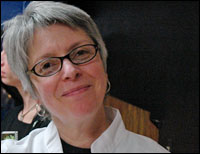
MD: I felt like I just had to do this when I looked at our hospital food and thought
"How dare we serve this food to people who need to heal"!
DR: Well, when I look at my mother-in-laws plate at the nursing home where she lives, those brown green beans and that mushy meat, I think
"How is this food not making people sick"?
MD: Well it is. It is making people sick only we aren't quantifying that right now.
We got together, we three girls, Diane and Ann and I, at my kitchen table and decided to tackle the kind of food that is served in hospitals. We decided to just stick our necks out. That was in October 2006. I got the department reassigned and we pestered the contractor - they were really difficult to deal with.
We did everything that we could to try and work with them. We introduced them to the farmers, formed a community coalition and held meetings to talk about what we could do. We had this vibrant community coalition of teachers and parents and doctors and farmers and a mayor and a representative in the state legislature as members of this great coalition and we would meet about four times a year.
A year and a half later we finally got rid of the contractor by implementing a request process.
DR: I know that all of that is much easier said then done. I can't even begin to imagine what that process was like.
MD: We hired a consultant, a great guy who was the chief chef at Yale.
CHEF ANNE GALLAGHER, Coordinating Chef of Plow to Plate
We are three women who were just chatting one day. We decided that it was a great concept to eat local foods as a way to be healthy and well.
Artistry starts with notes or words on a page, or paint and a canvas or choreography or ingredients. People that prepare food are artists just like musicians or writers or painters or dancers and, as with all art forms, inspiration is key. I love berries. As a chef I am inspired by the anticipation of berries being in season. I get a skip in my step when I know that I am going to be able to eat berries again. The way that nature dictates the seasons and then the seasons dictate what food we should eat, inspires me.
The best thing is to let the seasons dictate how you will eat. We've lost the natural instinct to eat well. But if we approach eating with an open mind, looking to see what is available, we will be led to create something healthy, beautiful and tasty. Walk into a farmer's market and let the market show and tell you how and what you will eat
I get great pleasure out of preparing a meal that people enjoy. When I see somebody eat well, I think that's great. And, it's not hard to cook great food. If you are buying food that is fresh and real, you don't have to do too much to it to make it delicious
Plow to Plate is causing people to really think about where their food is coming from, who is growing their food. There is all of a sudden this concrete consciousness that has come about because people are realizing that food is a very most important, simple and exciting thing in our lives.
Eating well allows for your body to operate better and for your mind to be clearer. Eating consciously allows for us to feel like we can take more ownership of our lives.
I have a great respect and reverence for this gift that we have that comes out of the earth and sits on our plate in all its beauty and nourishes us. Food goes beyond sustenance. Food is a miracle that we take for granted and if you can sit down to a beautiful meal with friends and family - to me, there is nothing better.
Yale decided to change their food system in 2001 after Alice Waters dropped her freshman daughter off, saw the food that was being served, went to the president and said "This has got to change and I am not going away so how are we going to change it"! The president called his then executive chef, John Turenne, and said "I want you to come and meet with a parent". John said "What are you talking about? I never meet with parents". And he said, "This parent is different. This parent is Alice Waters." John dropped his teeth.
John and Alice decided to work together. They took one cafeteria in one of the college dorms and changed the food. Pretty soon all of the kids were counterfeiting their student I.D.'s to get into that cafeteria. John found his calling and started his own consulting company and I hired him to help me change our process.
It was a very big deal to do this. We decided that we were not going to go self operating which would have been the easy way out. We decided to challenge the industry by putting out request for proposals, by getting bidders and by creating a state-of-the-art contract so that other hospitals would have an easier time doing this. We decided that we would give other organizations our stuff!
We created an educational program last summer called Healthy Food Learning Experiences. It is a new kind of class where we get farmers and chefs and doctors together and we do a whole series of these learning experiences at a local cooking school that is part of Hunt Hill Farm Trust, which is a wonderful farm here that has lots of different things going on including a cooking school called The Silo. It was a homerun! People were loving it! We had fishermen, beef farmers, vegetable farmers and they all talked about how the food was raised or grown and the chefs would talk about how to prepare it to keep all of its nutrients, then the doctors talked about why it really matters to get your nutrients from the food itself rather than supplements. Then we would talk in detail about the vitamins and minerals that each particular menu would provide. It has been over sold ever since.
We have partnered with New Milford Youth Agency. They have a farm program and a facility for after-school programs with a commercial kitchen and so we thought "Wait a minute! We can do a Plow to Plate kids program turning these kids into peer advocates and peer navigators, teaching them about local food"! It took me seven different funder's grants to raise $60,000. It was hard work but we got it.
The kids work seasonally. They learn about the seasonal food supply, how to harvest and how things are grown, how to prepare and share and how to become an advocate. They are taken on field trips to the fish docks in the spring and they get ingredients that grow in the spring time from local farms. They prepare meals for family and friends and then they do it all over again in the summer and again in late summer and again in the fall. They also prepare a winter harvest meal. They are taught proper knife skills and they wear proper chef's outfits and we teach them the value of each meal. These kids are so proud. The program is a total home run! All I have to do is keep raising the money.
DR: So, why wouldn't other hospitals or schools want to do this? Is it because it isn't cost effective or is it because of existing relationships with vendors?
DOCTOR DIANE D'ISIDORI, Pediatrician and Medical Advisor
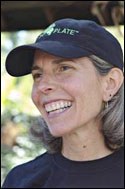
A lot of people don't realize that eating is a fundamental and important piece of our health. You are what you eat. That sums it up. Every little molecule that we put in our mouths gets incorporated into our bodies so on a very basic level just promoting healthy, whole, unadulterated foods like fruits and vegetables and whole grains is vitally important.
Plow to Plate promotes the food that our local farmers are producing. This has pretty big implications as far as what we eat because it can stem the rise of a lot of diseases that we are seeing, from obesity to just the malnourishment of a lot kids simply because they are not eating good food. They may not be obese. They may not develop diabetes but they are certainly not healthy. It is not in response to obesity or chronic disease that we created Plow to Plate, although that is very important. Rather, we created Plow to Plate to promote people being healthier.
The food that we eat has a direct correlation to our health, but it goes beyond that. What we eat or don't eat affects other aspects of our community and our environment. For instance, consider an apple. An apple contains only that which nature has provided like all of the inherent nutrients and antioxidants and it doesn't have unnatural additives. If you make applesauce from that apple that is good but if you buy applesauce from the grocery store that applesauce might have other ingredients that we don't want in our bodies like preservatives or high fructose corn syrup. So with processed food, something is taken out of it or put into it that nature didn't put there to begin with and our bodies are not used to that because we are nature ourselves.
We also have to take into consideration what it takes to produce that applesauce from the grocery store. What was the transportation to get it there? What has that done to the environment?
The point is that we need to think about what we are eating and about what it has taken to get to that. That it will open our eyes to all of the ramifications that exist around what we eat.
Plow to Plate is educating the community about the connection between the land, the farm, the farmer - connecting our food to our homes to our health and to our families. We are about promoting good health and good community bonds through the food we eat. And, we started with a hospital because it just makes common sense. If you want to show the public that your food is directly related to your health then it's smart to start with an institution that is supposed to be all about health and healing. We are doing that. We are walking the walk.
My hope is that Plow to Plate becomes a model for the way physicians, health departments, agricultural preservationists, town governments, even hospitals and restaurants work and that it becomes a model for the way we think about our food. That is our goal. Food is so fundamental to our health and the vitality of our communities that it really needs to be nurtured and embraced. That is what we hope to see.
MD: Yes. Existing relationships and because they think it's hard to do which is why we created the request for proposals and the standard contracts.
We can share this model with other organizations. They don't have to pay lawyers, etc. We did all of that work and, thank you very much, now we are going to share it.
The other thing is that people think it is more expensive than it is but we are actually saving money. Now with energy and oil so high, everybody is starting to see that it would be much better to obtain their ingredients from local systems. So the tables have turned on the cost equation. It is now becoming cheaper.
We are talking to farmers about how they can start to grow for us next year and we are going to get our kids involved with working with the farmers. We are going to cross-pollinate all of these programs to help build a local sustainable food system here which will support the agricultural economy. That is a very big deal in Connecticut because we are losing so much farm land.
We have also developed our own currency called Farm Bucks.
We raised money through grants and created this five dollar bill that we use to work with pediatricians and family practice doctors. Families with small children get the five dollar bill from their doctor along with a packet of nutritional information, recipes and tips. They can use these Farm Bucks at the local farmer's markets so that we can drive traffic to the markets and so that families can experience the markets. Each Farm Buck has a serial number that will track what doctors were seen and what goods were purchased by what farmers so that we can start to analyze what is going on and promote local purchasing. (This is a very effective way to get the doctors involved. They rarely have time to talk about food relative to good health because they are under so much pressure but having a little packet encourages this kind of conversation). Then, the farmers send me the bucks and I send them a check from the grant money.
We are trying to touch every part of the community. Each component is very deliberate and tactical and is designed to get people thinking about how they eat.
DR: What is neat about all of this is that it revolves around this primal need that we all have to survive. I mean, we all have to eat.
MD: Our mission is Eat Food. Not too much. Mostly plants.
Food is so fundamental to health, community and family. We have lost all of that in this society.
DR: One of the things that I personally love about Plow to Plate is knowing that health care professionals are finally passionate about good food as a way to promote good health. I have not ever talked to a doctor or a surgeon or anyone in the health care field who are is as excited as you all are about food as a way to be healthy.
Do you have a plan yet for offering the model to other organizations?
MD: We are putting together a tool kit to replicate this.
We will go and mentor any hospital that wants to do a Plow to Plate program. We are going to do this in partnership with a national group that I work with called Healthcare Without Harm. We are one of eleven hospitals featured in a big survey and report that they did on healthy food in healthcare. Our program was one of eleven hospitals highlighted as a national model. I am working with Healthcare Without Harm to offer Plow to Plate to other hospitals nationwide, especially community hospitals because, in fact, most people in this country get their healthcare from community hospitals.
We want to replicate Plow to Plate because there is power in a brand. Just think, what if all of these hospitals were Plow to Plate hospitals? That would really get the attention of the food industry. If we all just do "one offs" it is not as powerful as a Plow to Plate movement in hospitals across the country.
The more power there is in breaking down the evils of the industrial food system and the industrial food service companies, the healthier we will be. But if there is just one little funky northwest Connecticut hospital that is practicing Plow to Plate, we can be dismissed. If we become a movement then they can't beat us down.
DR: A hundred years from now what do you hope Plow to Plate will be remembered for?
We are big proponents of teaching kids. The message of Plow to Plate needs to be spoken to our children. We have the youth program so that our kids have a fundamental understanding of where there food comes from and the significance of having it come from as close to home as possible because that will change the way a generation feels about what food is.
Community Coalition: Youth Program
Our Community Coalition formed a partnership with the New Milford Youth Agency and in March, 2008 launched a comprehensive program to create a "corps" of peer educators and advocates composed of middle and high school students. After mastering a full spectrum of "local food skills" -- farming, culinary, menu design, public speaking and advocacy -- these students will conduct outreach programs and demonstrations at local schools and social service agencies to share knowledge about the benefits of a health diet based on "Connecticut Grown" food.
Through field trips to farms, restaurants with local food menus and food distributors that work with Connecticut farmers, students will learn of the many career opportunities made possible by sustainable food systems. They will also receive school internship credit for their participation.
Learn more about Plow to Plate and their various programs and events at http://www.plowtoplate.org.
